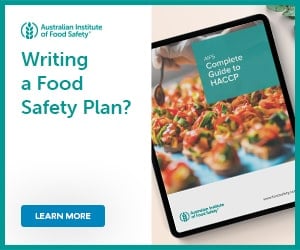
Food Standards Australia New Zealand (FSANZ) has been collecting food recall statistics since 1990. According to the organisation, a food recall is “action taken to remove from sale, distribution and consumption foods which may pose a safety risk to consumers.” The statistical information about these food recalls is then used to identify trends or any other problems that may be occurring in the food industry. They give the governing bodies of the food industry and snapshot of food safety in the industry, and what needs to be improved.
Food recalls are classified into different categories by FSANZ: microbial contamination, labelling, foreign matter, undeclared allergens, biotoxins, and chemical or other contaminants. There are also two different types of food recalls:
- Consumer recall. This is when a food item must be recalled from all areas in the production and distribution chain. The item must also be recalled from customers and is the most extensive type of recall.
- Trade recall. This is when a food item has not been sold to consumers, but rather must be recalled from wholesalers and distributors. This food recall may involve recalling the items from establishments like restaurants or catering businesses.
The statistics from 2019
The statistics for 2019 were released in March of this year and illustrate a concerning trend for food recalls in Australia. There were 87 food recalls in Australia, and they are broken down into the following categories:
- 32 recalls due to undeclared allergens
- 30 recalls due to microbial contamination
- 5 recalls due to foreign matter
- 4 recalls due to chemical contamination
- 3 recalls due to biotoxins
- 1 recall due to a labelling issue
- 12 recalls due to other issues
The three categories with the highest incidences of food recalls were undeclared allergens, microbial contamination and other. These statistics are concerning, as they point to a bigger trend that is appearing throughout the Australian food industry.
Bigger trends are revealed
The food recall statistics show an increase in recalls year over year, particularly from January 1, 2010 to December 31, 2019. Over this time period, FSANZ recorded a total of 707 food recalls. (The average number of food recalls per year is 71.)
The three highest categories for recalls in the ten-year time period were undeclared allergens and microbial contamination and foreign matter. Undeclared allergens accounted for 283 recalls, microbial contamination for 181 recalls and foreign matter for 101 recalls. Two of these categories are part of the top three categories of food recalls from 2019. This indicates that the incidence of food recalls related to these categories have yet to be brought down.
Allergen-related recalls
FSANZ statistics show that of the top ten food allergens, undeclared milk has accounted for 30% of all allergen-related recalls since 2018. This is followed by multiple undeclared allergens (17%) and peanut (14%). Undeclared allergens resulting in food recalls is a big concern, as the number of Australians suffering from food allergens is growing every year. According to the Australian Society of Clinical Immunology and Allergy (ASCIA), food allergies affect 10% of children up to one year of age, 5% of children up to five years of age and approximately 2% of adults.
Food businesses need to be acutely aware of the top ten food allergens and how to prevent a severe allergic reaction from occurring on the premises. This involves knowing how to prepare an allergen-safe meal, how to read food labels, and how to prevent cross-contamination. It also requires that food businesses stay up-to-date on food recalls.
Microbial contamination
FSANZ statistics show that food recalls due to microbial contamination are often associated with Listeria monocytogenes, Salmonella and E. coli. Salmonella-related recalls increased in 2019 due to the multiple recalls that were related to Salmonella Enteritidis entering the egg supply. However, on the positive side, recalls for Listeria decreased slightly.
Microbial contamination being one of the top reasons for food recalls in Australia is a big concern. This is because food-borne illness outbreaks can stem from these microorganisms and cause many people to fall ill or even die. Biological contamination of food can happen at any point in the food supply chain, so food safety precautions must be followed and executed at every step in the process. For food businesses, maintaining food safety includes cooking food to the proper internal temperature, preventing cross-contamination of food, understanding the different types of contamination and keeping food out of the Temperature Danger Zone (5°C – 60°C). Staying up-to-date on food recalls is also essential.
Food safety is key
These food recall statistics provided by FSANZ illustrate the vital importance of food safety within the industry. The overall rate of food recalls is continuing to rise, pointing to areas of the supply chain that need to be watched very closely. However, these statistics also indicate that the food recall process is working efficiently by pulling back products that could harm consumers and food workers. Protecting people from food-borne illness, severe allergic reactions and other food safety incidents are key to maintaining a thriving food industry.




